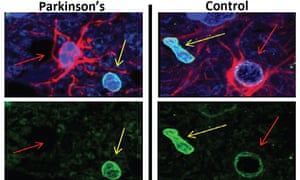Flushing out 'zombie cells' could help stave off Parkinson's, study suggests
Possible approach to treating effects of neurodegenerative diseases – and even ageing – revealed by trial
In work that could open a new front in the war on Parkinson’s disease, and even ageing itself, scientists have shown that they can stave off some of the effects of the neurodegenerative disease by flushing “zombie cells” from the brain.
The research in mice raises hopes for a fresh approach to treating the most common forms of Parkinson’s disease, which typically arise through a complex interplay of genetics, lifestyle and potentially toxic substances in the environment.
But the approach may have benefits far beyond Parkinson’s, with other neurodegenerative diseases – and the ageing process more broadly – all being linked to the ill effects of these “senescent” cells, which linger in tissues after entering a state of suspended animation in the body./.../
...........................................
Study suggests that exenatide, currently used to treat type 2 diabetes, improves movement-related issues and might also slow the progression of the disease
A drug commonly used to treat diabetes could help those living with Parkinson’s disease, research has revealed.
By 2020 it is predicted that 162,000 individuals in the UK will be living with the condition. While existing drugs help to control its symptoms, there are currently none available which slow or halt its progression.
But now scientists say they have found that a drug commonly used to treat type 2 diabetes appears to improve movement-related issues.
The benefit persisted even when the drug had not been taken for 12 weeks, suggesting it might be helping to slow the progression of the disease./.../

No comments:
Post a Comment